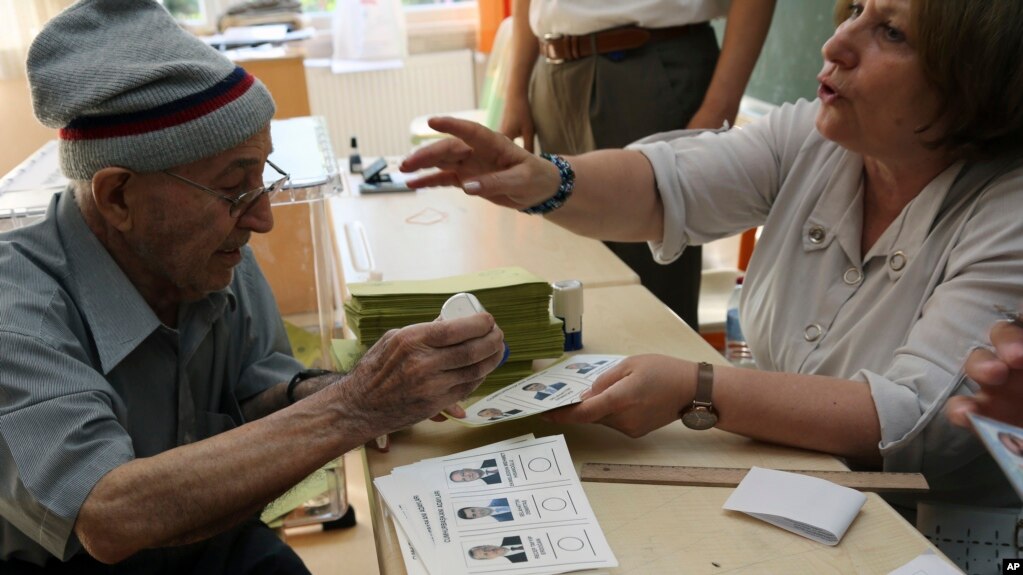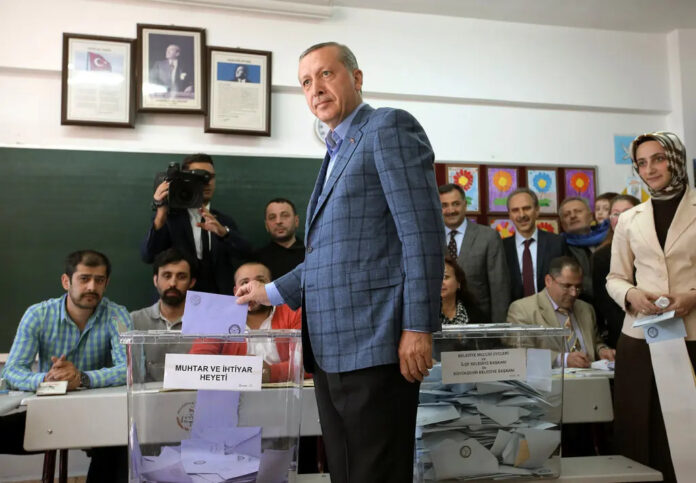Turkish Prime Minister Recep Tayyip Erdogan won the country’s first direct presidential elections. He was the 12th president of Turkey. The victory will extend Erdogan’s more than 10 year rule over the country for another five years.
According to official figures, he secured approximately 52 percent, opposition candidate Ekmeleddin Ihsanoglu, a former diplomat and academic, 38.34 percent and the third candidate, Selahattin Demirtas, 9.71 percent respectively. The huge margin of victory means there is no need for a run-off. Overall turnout was about 74 percent. The victory of Erdogan would will have important consequences for the country’s future and region as well as.
| Candidates | Percentage % | Number of Votes |
| Recep Tayyip Erdoğan | 51.65 | 20,669,955 |
| Ekmeleddin İhsanoğlu | 38.56 | 15,432,166 |
| Selahattin Demirtaş | 9.78 | 3,914,427 |
| No. of Voters: 55,701,719 | Vote Cast: 41,281,860 | Valid Votes: 40,544,006 |
Geographical Diversity
In the first direct presidential elections the expanses of the conservative Anatolian heartlands voted overwhelmingly for Erdogan, the more liberal western Aegean and Mediterranean coastal fringe was dominated by main opposition candidate Ekmeleddin Ihsanoglu, and the southeastern corner by Kurdish candidate Selahattin Demirtas which showed the diversity of Turkish politics.
Re-birth of new Turkey
Turkish Prime Minister Recep Tayyip Erdogan who has vowed to bolster the power of the president, promised supporters a “social reconciliation period”, saying: “Let’s leave the old discussions in the old Turkey.” He added in the speech in Ankara: “Today, not only those who love us, but also those who do not have won. Today Turkey has won.”
Main Opposition Presidential Candidate
Selahattin Demirtas, co-chairs of the pro-Kurdish Democratic People’s party (HDP) backed by left-leaning secularist Republican People’s Party (CHP) and Nationalist Movement Party (MHP), the two largest opposition parties in the country, in addition to various smaller ones emerged as the surprise winner in several provinces outside the Kurdish region the party managed to substantially increase their votes. More than, 53 million Turkish were casted their votes. For the first time, more than three million Turks living abroad also voted in this first directly contested presidential election 2014.
New Era of Presidential Politics
Erdogan, 60, has been in power since 2003. His ruling Justice and Development party (AKP) triumphed in local elections in March, 2014. A clear victory on Sunday would solidify Erdogan’s hold on Turkey and put an end to what many see as his most difficult year in power.
The Turkish president was previously chosen by parliament, but a 2010 referendum gave Turks the power to choose the head of state by direct vote. Until now, the presidential slot has largely been a symbolic one, but Erdogan has repeatedly underlined his wish to use “the full extent of his constitutional powers” to be an active president.
President’s Discretions
While the presidential office is often described as ceremonial, Turkey’s president has the ability to veto legislation, appoint judges and call national security meetings. Moreover, the office has the power to promulgate laws or return them to the parliament for reconsideration, to call public referendums, to call new parliamentary elections, to appoint the prime minister, ministers and key bureaucrats. And analysts say Mr. Erdogan is likely to exercise powers that former presidents chose not to use, such as calling cabinet meetings.
Different Election Campaigns
| Different Candidates | Details |
| Recep Tayyip Erdogan (Government’s Candidate). | He talked about infrastructure projects, foreign policy moves, economic reforms, and a new constitution featuring a presidential system, signaling an unconventional and active presidency. |
| Plus-Points | Well known to common people, charismatic, strong socio-economic indicators having sense of practical politics with diversified political support in the country. |
| Ekmeleddin Ihsanoglu (Opposition’s Candidate). | He stressed unity and neutrality drawing a more traditional and passive picture for his potential presidency. He wanted to maintain status quo in Turkey’s national politics. |
| Negative-Points | Conservative academic and diplomat who used to lead the Organisation of Islamic Cooperation. He was largely unknown by Turkish public. |

Critical Analysis
(a) The opposition failed to pick a candidate who could represent them and reveal the synergy of their alliance. Moreover, lack of enthusiasm was one the main reasons of its defeat.
(b) Erdogan’s media team succeeded to win the support of the common people throughout the country.
(c) One of the main reasons for Erdoğan’s victory is an extremely energetic and aggressive election campaign by Erdoğan. He did not want to leave anything to chance. He maximized the use of media. When thinking of Erdoğan’s rivals, Ekmeleddin İhsanoğlu and Selahattin Demirtaş, they used a more moderate tone in their election campaigns.
(d) Local election’s victory in March 2014 paved the dividends for Erdogan, a vote which was treated as a referendum on Erdogan’s performance as a leader. The ruling party secured 46 percent of the national vote while the main opposition centre of left Kemalist Republican Peoples’ Party (CHP) and Nationalist Movement Party (MHP) secured a comparatively modest 28 percent and 18 percent respectively.
(e) Erdogan’s discourse of socio-economic prosperity, participatory national approach, balanced foreign policy, and the last but not the least, active presidential slot successfully convinced the voters.
(f) Demonstration of mega projects/optics, political achievements and stability of macro-economy made the difference.
(g) It is because of the economy. Over the past decade millions of Turks have been lifted out of poverty. When the financial crisis hit Europe, Turkey’s economy, fuelled mainly by domestic consumption, kept expanding; growth was over 9 percent in 2010. Shiny new hospitals, in which the needy receive free treatment, have bolstered a sense of stability and well-being.
(h) The first direct presidential elections have shown that Turkey is stuck with identity politics. It proved once again after local elections March 2014, that the Justice and Development Party [AKP] is the party for the religious, the conservative. The Republican People’s Party [CHP] is the party for the seculars, or modern people with worries. The Nationalist Movement Party [MHP] is the nationalists’ and the Peace and Democracy Party [BDP] is the Kurds’. Turkey is stuck to four parties of identity politics. It has its sociological reflections in society. In the past, the identities were pushing the parties, but now parties are manipulating the identities and shaping their sociological bases. AKP is not getting all its votes from being religious, but from its power and Recep Tayyip Erdoğan’s leadership character.
(i) Increasing of polarization. It could be seen in the presidential election results. The polls were determined by being “pro-Erdoğan” or “anti-Erdoğan,” citing that as a result of the oppositions’ failure.
Different Views
| Positive | Negative |
| The victory of Erdogan consolidated Turkey’s status as a regional economic force. Speed-up process of reforms. Continuity would bring more inflows of FDIs, FPIs, joint ventures and financial stability. It would also put an end to political chaos and societal divide. | Critics warn that a President Erdogan, with his roots in political Islam and intolerance of dissent, would lead the NATO member and European Union candidate further away from Ataturk’s secular ideals. |
Expected Issues
(a) Selection of a loyal prime minister
(b) Under the Turkish constitution he will have to break with the AK Party before his new role as president of Turkey.
(c) Political and administrative grip on his party AK.
(d) Creation of an executive presidency, a reform which requires either a two-thirds majority in parliament or a popular vote. It would also trigger early parliamentary elections, which is normally scheduled for June 2015. Right now, the AK lacks the two-thirds majority in parliament needed for the constitutional tweaks to increase the president’s powers. He would again need the support of Turkey’s 12 million-plus Kurds to establish an executive presidency. A two-thirds majority of parliamentary seats is needed to change the constitution. At least 330 seats (the AKP holds 313 seats of 550) are required to hold a referendum.
(e) A shift in the regime from a parliamentary to a strong presidential model.
Concluding Remarks
By winning the first direct Presidential elections Turkish Prime Minister Recep Tayyip Erdogan has started his journey towards executive presidency. It is high time to reassert the equality of all individuals irrespective of religions, sects, ethnic identities, political affiliations or opinions and embrace everyone.
The presidency should be a source of unity, not a factor of disintegration. More sincere efforts must be initiated for more democratization in the political system and society alike. There is also an urgent need to revisit Turkey foreign policy and options in the region and on global issues. It is the beginning of new Turkey where everyone is respected and equal. It is the beginning of new era in Turkish politics where politics means submission, service, and delivery.




